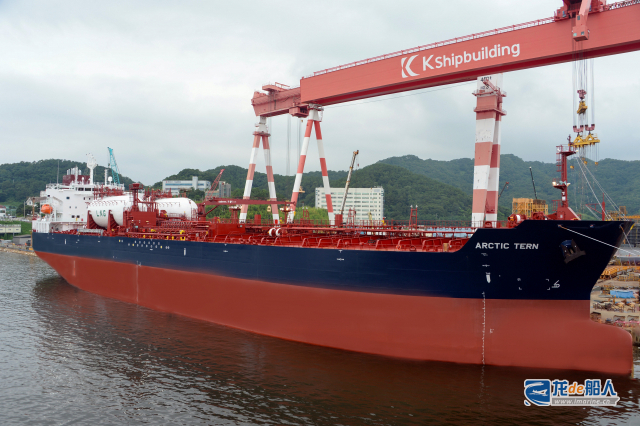On July 16, South Korea’s mid-sized shipyard K Shipbuilding (formerly formerly STX Offshore & Shipbuilding) announced that it had delivered its first 50,000 dwt liquefied natural gas (LNG) dual-fuel powered product tanker, the “ARCTIC TERN”, since its establishment.

“ARCTIC TERN” has an overall length of 182.9 meters, a beam of 19.1 meters and a speed of up to 14.5 knots; it can run on both LNG and conventional marine fuels, which reduces carbon dioxide emissions while maintaining economy compared to ships running on conventional marine fuels only. The shipbuilding contract was signed in October 2021 and construction began in June 2023.
K Shipbuilding has delivered a total of 240 vessels to date, and the successful delivery of the first 50,000 dwt LNG dual-fuel-powered product tanker will further strengthen the yard’s position in MR product tankers. The shipyard sees this as an important example of the growing market for eco-friendly ships, in line with the International Maritime Organization’s (IMO) and the European Union’s (EU) global greenhouse gas reduction strategy.
In the product tanker market, K Shipbuilding has received orders for six new vessels this month, respectively signing a contract for the construction of four 75,000 dwt LR1 product tankers with Dubai-based independent chemical/tanker company Gulf Energy Maritime, and signing a contract for the construction of two 50,000 dwt MR product tankers with Vietnam’s Asia-Pacific Shipping Company (ASP). The total value of the orders for the six new vessels of the two types is KRW 540 billion ( about $392 million), and the delivery dates are undisclosed.
Shipbrokers analyzed that the cost of a single 75,000 dwt LR1 product tanker is slightly more than $70 million, and based on this calculation, the total value of four LR1 product tankers is about $280 million, and the total value of two MR product tankers is about $112 million, with a single unit cost of about $56 million.
K Shipbuilding said the product tankers will use conventional fuels, but will be dual-fuel reserved design that can be upgraded in the future to use liquefied natural gas (LNG) methanol or ammonia fuels. The new shipbuildigs will be equipped with the K Smart Ship Solution developed by K Shipbuilding.


